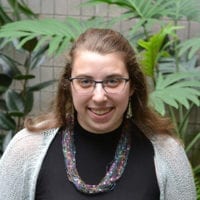
“A strategic analysis of the institutional public outreach event Art@BTI“
Project Summary:
The Boyce Thompson Institute is a leader in the field of basic science research of plants and other organisms. The Institute’s drafted Strategic Plan for 2018-2023 calls for outreach through “participat[ing] in activities that engage the general public” and creating “impactful outreach initiatives,” but data are lacking to inform these objectives since BTI’s public outreach is still in development. BTI’s main public outreach activity is Art@BTI, a semi-annual exhibition of a local artist’s work throughout BTI, accompanied by a one-time event. The recent Art@BTI featured local artist, Nancy Ridenour. A reception was held on May 31st, 2018, which included a presentation by professor Joyce Van Eck on her Physalis project. This study aims to understand the impact of Art@BTI, with the intention of (1) describing the current outcomes of the event, and (2) comparing these outcomes with BTI’s public outreach goals to facilitate future event planning. A Qualtrics survey was sent to the 2018 Art@BTI event attendees. The response rate was 44% (22/50). Primary motivations for attending the event were to “Learn about BTI” and “Socialize with friends/colleagues.” All respondents would attend another Art@BTI or other BTI event (100% responded positively on the Likert scale), yet only 60% felt they understood BTI’s mission better after attending the event. BTI’s Advancement team can utilize survey outcomes for future event planning to achieve institutional goals, such as gaining new donors, increasing brand awareness, and communicating BTI’s science to the public.
My Experience:
As the Science Communications PGRP Intern, I had a packed summer full of education and practice. I learned new techniques in media creation and editing, technical writing, social media curation, and research while also having unique experiences I could not have at another internship. Working directly with a mentor was rewarding and personal, making the experience seem exciting rather than daunting. I learned more than I could have imagined from my colleagues and peers, and I met with science communication professionals weekly to talk about careers and graduate school. Between seminars, workshops, a graduate student panel, a bioinformatics course, and more, the diverse experiences offered made the summer feel dynamic and educational. I feel humbled to be the first Science Communications Intern, and I hope to utilize the skills I gained this summer to continue pursuing my passion of educating people about science and the intricacies of communication!
